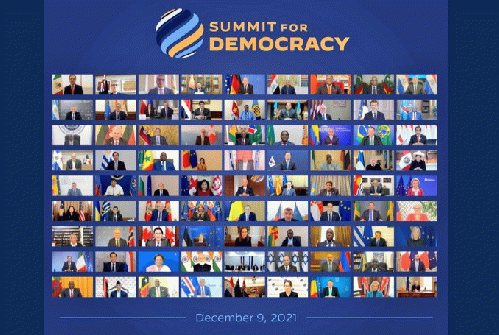Democracy as commodity
The U.S.' Summit for Democracy has come and gone without too much fuss. It was a strange little show with the leader of the so-called 'free world' - being those "democratic" countries that for whatever reason support U.S. dictates - attempting through rhetoric and probably a few winks and nods to maintain its establishment as the group's leader. From what I saw in the MSM it really amounted to little and may well have shown how weak the supposed leadership is.
It did however raise the very good question of what democracy is. From its etymological roots it simply means essentially "power by the people" although even that has various interpretations, none straying far from that simplicity. As for practical applications there are many different routes that can be taken, different levels of democracy depending on initial premises. For example the idea that capitalism is the main pillar of democracy is a premise that allows all kinds of actions that are decidedly non-democratic. To present arguments as to what democracy is leads into a mess of philosophical arguments leaving no verbiage unturned in pursuit of its definition to support politicians' practical applications.
It is therefore not a good argument to get into. Instead what makes more sense is to look at how societies apply their laws domestically in practical situations towards their citizens and with foreign affairs against others. In other words the following is more a look at actions taken that are definitely non-democratic, a view that seriously limits the understanding of democracy as "power by the people".
Freedom and democracy
There needs to be a differentiation between freedom and democracy. While the two go together well, freedom can be had without democratic control, according to the whims of the government, and according to the perhaps unseen aspects of domestic control (laws and belief systems) that are disguised as freedom. An example of the latter would be the theorized "rugged individualism" as propounded by many U.S. authorities, which really indicates that, if one cannot make it in society it is all your own fault, and not society's.
Domestic
There are some big obvious practical issues that deny democracy. Probably the biggest is racism in its many forms. Different laws for different sections of the population based on race or ethnic background are decidedly non-democratic. This includes various "reservation" systems as applied to all the British colonial-heritage countries, mainly the "Five Eyes", the imperial system as exercised in Canada, the U.S., New Zealand, and Australia. It includes apartheid states like Israel, and formerly South Africa.
Domestic spying is another form of non-democratic action. Still with the Five Eyes, their nominal designation is based on their actions of spying on foreign countries, including those within the group - one of their main purposes is to avoid the legal entanglement of a government spying on its own people. Other countries are not so constrained and any government that has a security system for internal security certainly spies on its citizens. Canada's government has its Communications Security Establishment (1946) and its better-known component, CSIS. The U.S. has various spy and policing agencies, the FBI being the best known, keeping records on many of its citizens mainly for political reasons. Israel's Shin Bet works hand in hand with the military to control the indigenous Palestinian population.
Along with those spy organizations goes a highly militarized police force. These forces are used to control opposition street-level (democratic) protests against mostly corporate actions supported by governments. This comes back to reservations and apartheid as much of the use of militarized police is to control domestic protests originating from land and resource arguments from indigenous populations. Accompanying this in various levels are outright murder, torture, inhumane treatment, and outright deniers of humanitarian law. Examined in this light, the Five Eyes and Israel are decidedly non-democratic.
Election laws and rules have a large impact on the application of democracy. For all its self-vaunted mastery of democracy, the whole U.S. system is clearly non-democratic. They put on a great show with constant year-round electioneering and much less governing for the people. The current system of the Electoral College was mainly established to keep the rabble, the "factions", from having any say in governance. The gerrymandered districts effectively assure certain areas of remaining with a particular party and are usually based on race or ethnic background although in Ireland it contains the religious component as well (although that is mostly ethnic - immigrant Scots versus indigenous Irish). Many other smaller seemingly innocuous laws limit democracy, some being simply outright petty and stupid, such as Georgia's law against giving water to voters.
One of the larger factors in the U.S. is the huge amount of money corporations are allowed to spend on elections as determined by "Citizens United" in which donations of money are considered free speech and corporations are "people". Supposedly intelligent people believe this stupidity - mainly as it serves their own power and finances. There is no people power when corporations are usually able to buy their favored candidate. The combination of predatory financialization (meaning most of us live in debt servitude of some kind to some bank or other) and corporate militarism (spending huge amounts of money 'liberally' distributed throughout the country for political gains) certainly does not give power to the people.
(Note: You can view every article as one long page if you sign up as an Advocate Member, or higher).





